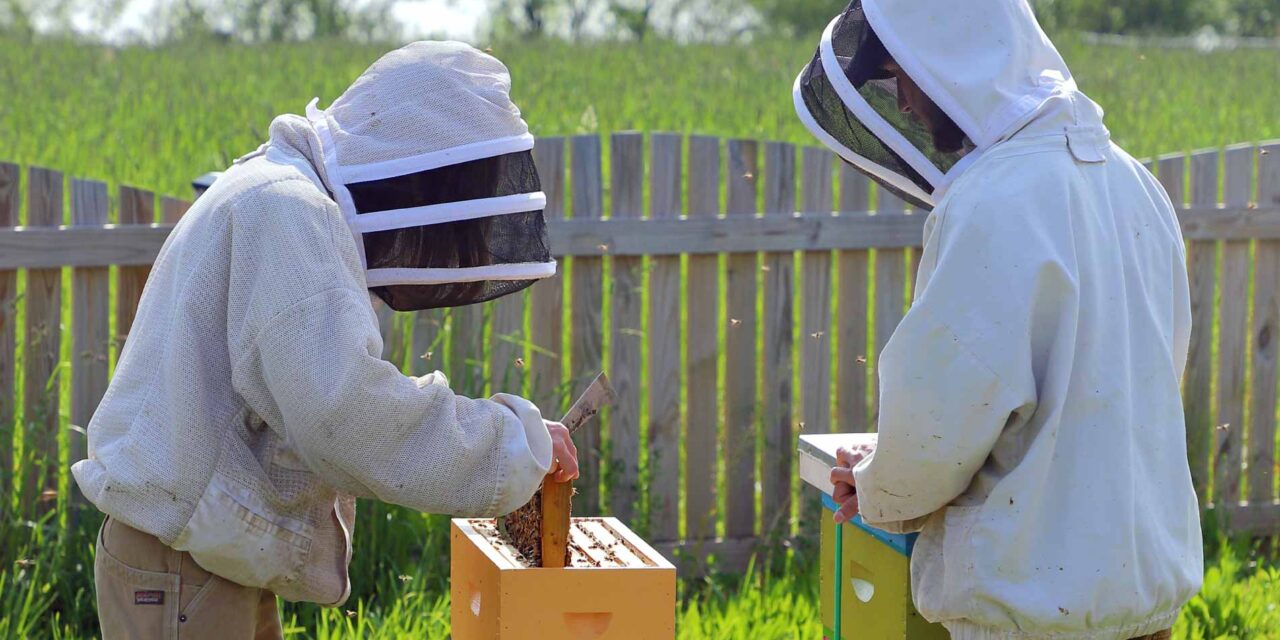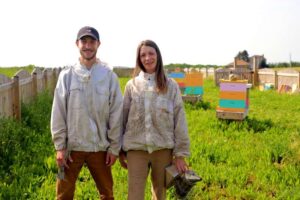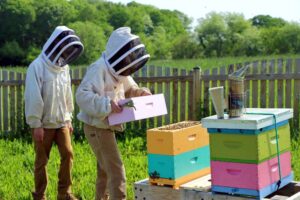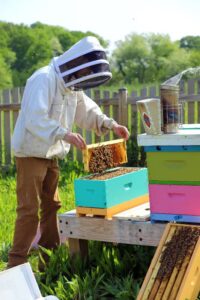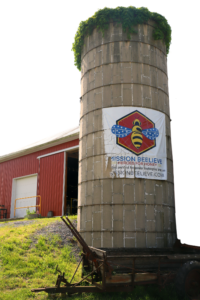Tristan Bannon and Monica Schmitt inspect the hives at Mission Beelieve in Taneytown. (above)
Mission Beelieve Teaches Beekeeping Skills to Veterans and First Responders
by Lisa Gregory , photography by Nikola Tzenov
Even on his darkest of days, Eryck Stamper knows that the bees and hives are there waiting for him. A quick trip from Baltimore to Carroll County will find him in a place of peace and purpose.
“This is my distraction to my suffering,” says Stamper. “Just the trip up here alone gets me out of the zone of being locked in my basement and trying to stay away from the world. Knowing what I’m going to do when I get here — take a look at my bees and go sit next to the hives.”
He adds, “I often say, hands in the hive keeps me alive.”
Mission Beelieve, located on a farm outside of Taneytown, offers educational and therapeutic beekeeping training for veterans and first responders. Stamper is a veteran who spent 23 years in the Navy. And he struggles.
“Physical, PTSD, anxiety and depression,” he says.
Established three years ago, the nonprofit Mission Beelieve currently has nearly 100 participants. And while there are similar programs and efforts across the nation, “We are all kind of different,” says Monica Schmitt, who along with her son, Tristan Bannon, created Mission Beelieve. “We’re an educational-based program, and we want to make sure that these men and women have a proper education to create sustainable beekeepers. We don’t sit in groups and hash out what has happened. We know what’s happened, right? You can’t erase that.”
But, she said, “We take the approach of ‘Let’s teach them how to focus on positive things instead of negative things that have happened in their lives.’ Teach them to repurpose that energy into something more meaningful.”
And tending those hives can be quite healing. “You can’t be distracted or focusing on a problem in your life because the bees will know when you’re distracted,” says Schmitt. “Their humming will change. And they will quickly remind you that you need to focus on them.”
Mission Beelieve participants learn to manage their own colonies through a beginning beekeeper course, mentorship, hands-on workshops and seminars. Instructors include some of the best and most knowledgeable experts on bees and beekeeping. Mission Beelieve is also involved in community outreach and spreading the word on the value of pollinators and restoring lost habitats.
The mission of the organization speaks to Schmitt directly.
“A lot of the men in my family are ex-military,” says Schmitt. “And that’s really the big reason why we did this. Because they didn’t have anything. All of them suffered from serious PTSD. They were in Vietnam, Korea. Some of them were in World War II. They lived it.”
But it was her son who brought bees into their lives. Bannon was intrigued by bees early on. “I remember in ninth grade, I was in art class, and I was drawing bees,” he says with a grin. “And the more I kept thinking about it and as I got older, I was like, beekeeping sounds like the avenue to really achieve freedom and have a job where you can be yourself and have your own business.”
He would go on to pursue work on a farm in Oregon. But the bees, he says, kept calling to him. “I would travel with my friends, and every time we would go somewhere, there was either a swarm or a colony,” he says. “And it was everywhere we went. I just couldn’t get away from the bees.”
Even in downtown Los Angeles. “I walked by a fence and there’s a swarm of bees all over it,” he recalls. He got the message loud and clear. “He would say to me, ‘Mom, I’m telling you they are telling me that I need to be with the bees,’” says Schmitt.
The mother and son took the bee signs to heart and began learning beekeeping, which would lead them to create Mission Beelieve. Schmitt is also currently president of the Carroll County Beekeepers Association, and Bannon is a member.
Not all participants at Mission Beelieve are just straight-up beekeepers. John Cullom, for example, has followed a different path, though no less tied to the art of beekeeping. He is a woodworker at Mission Beelieve who builds hives and beekeeping equipment. He even has his own business, Whistlepig Woodcraft. “He’s our in-house craftsman,” says Schmitt. “We provide him a space here for his woodworking, and he provides us with hives and equipment.”
“My father taught me woodworking when I was a kid,” says Cullom. “So I started making my own stuff.”
Like so many others, Cullom had to adjust to life after retirement as a first responder. He spent 30 years as a fireman in Baltimore City, including time as a captain. “I’ve seen every way you can possibly die,” he says of his career. “I’ve done CPR on infants. I’ve seen people burned up. I have seen people in accidents and crushed in cars.”
After retiring, Cullom, who resides in Westminster, was no longer distracted by his daily duties and those memories and images came back to haunt him. So he decided to get himself busy again and tried beekeeping. He met Schmitt while developing his interest in beekeeping and was one of the very first involved with Mission Beelieve.
“Now he’s got his own business providing all the beekeeping equipment to the beekeeping community here locally,” says Schmitt.
Whether it’s hands in the hive or on the wood, there is comfort and hope to be found through the work of Mission Beelieve. And while Cullom is hesitant to talk about the things he has seen and experienced as a first responder and the impact it has had on him, he makes the effort despite the discomfort. He knows that it may matter to others.
“Maybe I can help someone else,” he says.
And at Mission Believe that’s what they do — help each other. And the organization is buzzing with success.
In fact, Mission Beelieve’s honey, which has been honored nationally, is available for purchase, with proceeds going to the organization. For those like Stamper, there is nothing better than the finished product. “You tell yourself, ‘I made this with my bees that I kept alive and took care of, and now I’m going to have a big teaspoon of it in my tea,’” he says.
Like Cullom, Stamper has seen his path into beekeeping and his place with Mission Beelieve evolve into other areas. “He is our outreach coordinator,” says Schmitt. And he has been busy spreading the word and interacting with leaders at such places as the Maryland Department of Veterans Affairs about the organization and its mission, which continues to grow.
“We’ve been fundraising to build this therapeutic bee house, and we are breaking ground on it in a few weeks,” says Schmitt.
The therapeutic bee house will have hives that do not require standing or heavy lifting — ideal for beekeepers who use a wheelchair, for example. “We want to provide accessible beekeeping,” says Schmitt, “because we have a lot of men and women who are physically challenged. They feel like they can’t be included in something like this. But beekeeping is so flexible that we have the ability to make it feel like it’s inclusive and that they can do it too. We can show them how.”
And by doing so, continue to touch the lives of those who have given so much of their own for others.
“The people who come to us have that need to serve and to give back,” says Schmitt. “And that’s the big thing with beekeeping. It’s not that you’re serving human beings, but you’re taking care of this insect. And this insect will reward you for the care and love that you give it. And that is really healing.”

